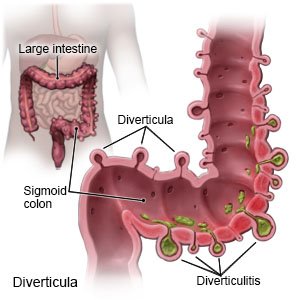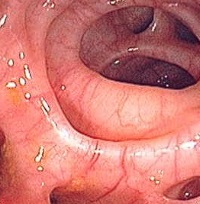Diverticular Disease
Diverticular disease is the name given to a long-term condition which causes small pockets or out-pouchings to occur in the bowel wall (Diverticulosis). These pockets (diverticulae) can remain trouble-free or they can become inflamed, causing pain and changes in bowel habit this is called diverticulitis.
What causes diverticular disease?
| Diverticulae are caused by a weakness in the wall of the bowel. This weakness is thought to be caused by genetic factors or a diet which is low in fibre. These pockets become inflamed when undigested food becomes trapped within them. |
 |
What are the symptoms?
Diverticulosis causes no symptoms generally. Discomfort can sometimes be a problem before a bowel motion or passing wind. When the pouches or pockets become filled with faeces and as a result become inflamed, (diverticulitis) they can cause some pain and bleeding, mild nausea, upset bowel motions, pain and local tenderness in the left lower abdomen, and fever.
Occasionally a pouch can break open. This causes pain, very high fever and chills. This is an emergency and medical treatment should be sought immediately.
Diagnosis
|
To diagnose diverticular disease it is necessary to examine the inside of your bowel. This is usually done in two ways either by Colonoscopy or Barium Enema.
A barium Enema is when barium is fed into the bowel through the back passage and a series of x-rays are taken which show the outline of the inside of the bowel wall. This is done at a radiology department.
|
 |
Treatment
People with bowel pouches, which have not become inflamed, generally only require a change in diet to improve their condition. The diet must include good quantities of roughage. Fibrous fruits such as apples and pears are best, along with fresh fruits, vegetables and whole grain cereals. At least five servings of fruit and vegetables a day should be eaten (a serving corresponding roughly to a person's cupped hand).
Increasing the fibre in your diet may cause wind and abdominal pain for a few weeks. This is caused by the bowel adjusting to the change in eating habits. Increase the fibre gradually to minimise this problem. It is wise to visit a dietitian after being diagnosed with diverticular disease.
When the bowel pouches have become inflamed, (diverticulitis) treatment is aimed at resting the bowel, relieving pain and fighting infection. A low-fibre, or fluid only diet, is recommended to rest the bowel. It is important to prevent constipation and laxatives are prescribed to do this. Bowel spasms can be painful when the pouches are inflamed. Pain killers or anti-spasmodic tablets are prescribed to help.
The risk of developing infection when the pouches are inflamed is high. Antibiotics are prescribed to either prevent or treat infection. Occasionally, surgery needs to be performed to remove affected parts of the bowel.





